Select Works of W.H. Griffith Thomas (21 vols.)
Digital Logos Edition
Overview
W.H. Griffith Thomas, co-founder of Dallas Theological Seminary, gave young preachers this advice: “Think yourself empty, read yourself full, write yourself clear, pray yourself clean, and then enter the pulpit and let yourself go.” An Oxford graduate, Anglican pastor, prolific author, and popular speaker, Thomas writes with a magnetic fervor and compelling depth, crafting works brimming with spiritual wisdom and practical insight. The Select Works of W.H. Griffith Thomas gathers some of Thomas’ most significant texts. Explore this treasury of volumes and find devotional commentaries, studies of Apostles Peter and John, a systematic theology, texts on Christian living, an examination of the Paul’s prayers, a guide to Bible study, reflections on Communion, and much more.
This title is included in the following collections
You can save when you purchase this product as part of a collection.
Logos 9 Messianic Jewish Gold ...
$849.99$849.99Logos 8 Messianic Jewish Plati...
$1,499.99$1,499.99Logos 9 Messianic Jewish Plati...
$1,499.99$1,499.99Logos 8 Messianic Jewish Diamo...
$2,999.99$2,999.99
- $2,999.99
- $24,999.99

- Offers some of W.H. Griffith Thomas’ most significant books
- Includes texts of many of Thomas’ lectures
- Provides exposition of the Thirty-Nine Articles within a systematic theology
- Explores numerous aspects of Christian living
Griffith Thomas excels in spiritual depth, practicality, and simplicity of expression that makes the most profound truths come alive with excitement.
—Warren Wiersbe, author of the Old and New Testament “Be” Series commentaries
The reading of Dr. Thomas’ books creates in one a deeper love of and desire for God as revealed in his Word.
—William Graham Scroggie, author of The Unfolding Drama of Redemption
- Title: Select Works of W.H. Griffith Thomas
- Author: W.H. Griffith Thomas
- Volumes: 21
- Pages: 4,438
- The Apostle John: Studies in His Life and Writings
- The Catholic Faith: A Manual of Instruction for Members of the Church of England
- Christianity Is Christ
- “A Sacrament of Our Redemption”: An Enquiry into the Meaning of the Lord’s Supper in the New Testament and the Church of England
- The Apostle Peter: His Life and Writings
- The Conflict of Ideals in the English Church
- The Work of the Ministry
- Life Abiding and Abounding: Bible Studies in Prayer and Meditation
- Methods of Bible Study
- What Did Our Lord Mean? Notes on the Holy Communion
- The Holy Spirit of God
- The Prayers of St. Paul
- Grace and Power: Some Aspects of the Spiritual Life
- The Christian Life and How to Live It
- The Victorious Christ
- The Principles of Theology: An Introduction to the Thirty-nine Articles
- The Essentials of Life
- Hebrews: A Devotional Commentary
- How We Got Our Bible
- What about Evolution?
- Christ Pre-Eminent: Studies in the Epistle to the Colossians
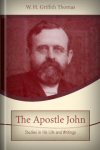
In the four sections of this work, W.H. Griffith Thomas gives careful, straightforward analysis of John’s life, Gospel, epistles, and book of Revelation. This text is designed to be especially useful for pastors and teachers instructing on John’s life and works, but serves as a useful resource for anyone studying the apostle John’s life or works.
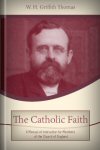
In this volume, W.H. Griffith Thomas provides a manual exploring the structure and teachings of Church of England. He provides a summary of Church history, and “indicate[s] the fundamental principles of the Church of England, to show how those principles are expressed in the formularies of doctrine and worship, and to point out what the principles imply and involve in the life of those who are bound by them.”
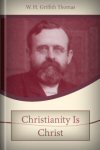
In Christianity is Christ, W.H. Griffith Thomas provides a short, accessible volume discussing “the substance of what has been written in recent years on . . . the person and work of Christ. It is intended to provide materials for answering [the] question . . . What is Christianity?” Thomas responds by pointing to Christ, as the single and only answer, thus addressing this question with a piece-by-piece examination of Christ’s character, claim, teaching, miracles, grace, influence, meaning, and resurrection.
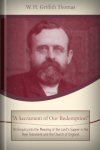
In this volume W.H. Griffith Thomas explores the meaning of Communion as it is “revealed in Holy Scripture and stated in the Prayer Book and Articles of the Church of England.” Using Scripture as the ultimate authority, he bases his study here, first examining the Lord’s Supper in the New Testament, and then analyzing it in the Church of England’s Prayer Books through the years, concluding with current teaching.
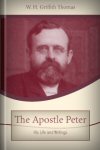
The Apostle Peter: His Life and Writings
- Author: W.H. Griffith Thomas
- Publisher: Eerdmans
- Publication Date: 1946
- Pages: 296
In this volume, W.H. Griffith Thomas analyzes both the life and the writings of Peter. This text is designed to be especially useful for pastors and teachers, but serves as a useful resource for anyone studying Peter.
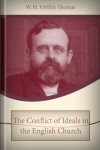
This brief volume is the text of an address given by W.H. Griffith Thomas to a meeting of the Wycliffe Association at Wycliffe College in Toronto, November 1910. In this lecture, he considers aspects of the Church of England in “the Old Country”—England—in comparison to the Anglican Church as it existed in Canada at the time.
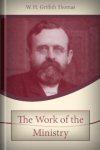
In this volume, W.H. Griffith Thomas compiles works on ministry from his five years as principal of Wycliffe Hall, Oxford, during which he undertook numerous aspects of ministerial life and service.
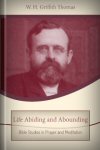
In Life Abiding and Abounding, W.H. Griffith Thomas explores the biblical command to “abide in Jesus.” Pointing to Scripture that assures us “God never commands without the grace to obey,” Thomas provides insight into how we can abide in Christ, giving us hope of the abundance and joy in life that awaits. He calls attention to “the twofold secret of abiding in Christ; the Word of God and prayer.”
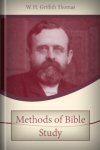
In this text, W.H. Griffith Thomas writes to “[direct] fresh attention to the value and importance of the study of the Bible itself as distinct from . . . the study of books about the Bible.” He suggests methods for “mastering the subject-matter of the Word of God, its facts and doctrines.”
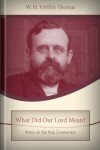
In this brief booklet, W.H. Griffith Thomas compiles a “statement of the main teaching of the New Testament and Prayer Book on the Lord’s Supper with special reference to present-day controversies,” designed to provide answers to basic questions about Communion.
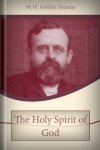
In this volume, W.H. Griffith Thomas discusses the Holy Spirit. Conducting careful, Scripture based analysis, he structures his work into four sections: “Biblical Revelation,” “Historical Interpretation,” “Theological Formulation,” and “Modern Application,” with chapters on the Holy Spirit in the Old Testament to ones the Holy Spirit and Modernism.
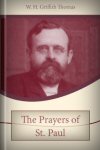
In this text, W.H. Griffith Thomas looks at the spiritual life of St. Paul, through examining “prayers, thanksgivings, doxologies, and personal testimonies.” Thomas focuses his explorations around subjects including “grace and holiness” and “conflict and comfort.”
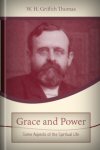
This volume focuses on everyday Christian living and the spiritual life. W.H. Griffith Thomas writes “in the first part, to call attention to some of the possibilities of Christian living; in the second, to some of its provisions, and in the third, to a few of its guarantees of protection.” He provides helpful insight into crucial topics such as grace, justification, faithfulness, power, and prayer.
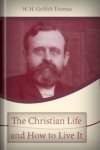
In this accessible volume on the Christian life, W.H. Griffith Thomas reproduces some of his various addresses and Bible readings, focused on helping Christians “experience and enjoy all that God has provided and intends for [them] in Christ.” He discusses essential tenets such as “What We Believe”, “Walking with God,” and peace in Christ.
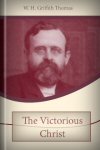
The Victorious Christ
- Authors: W.H. Griffith Thomas, et al.
- Publisher: Sunday School Times Company
- Publication Date: 1923
- Pages: 272
This volume compiles messages from conferences held by the Victorious Life Testimony Organization in 1922. It includes talks by W.H. Thomas Griffith, Gordon B. Watt, Howard B. Dinwiddie, and others, focusing on the Christian life.
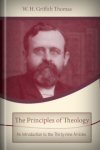
The Principles of Theology: An Introduction to the Thirty-Nine Articles
- Author: W.H. Griffith Thomas
- Publisher: Longmans, Green, and Co.
- Publication Date: 1930
- Pages: 540
In this volume, W.H. Griffith Thomas provides a systematic theology, based on his exposition of the Thirty-Nine Articles. He provides thorough analysis of each of the Articles, as well as a helpful introduction which gives a history of the Articles.
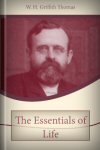
The Essentials of Life
- Author: W.H. Griffith Thomas
- Publisher: Pickering & Inglis
- Publication Date: 1935
- Pages: 127
The Essentials of Life gives an exposition of the essentials of the Christian faith. W.H. Griffith Thomas covers topics such as the need for and meaning of the blood of Christ, the concept of righteousness through faith, the fullness of the Godhead, and much more.
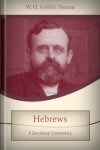
Hebrews: A Devotional Commentary
- Author: W.H. Griffith Thomas
- Publisher: Eerdmans
- Publication Date: 1962
- Pages: 186
In this volume, W.H. Griffith Thomas provides a helpful commentary on the book of Hebrews, especially designed for devotional use.
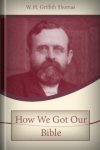
How We Got Our Bible
- Author: W.H. Griffith Thomas
- Publisher: Moody
- Publication Date: 1926
- Pages: 127
In How We Got Our Bible, W.H. Thomas Griffith gives a crash course in Bible background, covering everything from the structure and history of the Bible, to its authority, unity, trustworthiness, inspiration, purpose, and more. Thorough, yet concise and accessible, this text is a classic for its helpful introduction to the formation of the biblical canon.
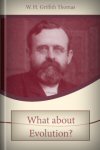
What about Evolution?
- Author: W.H. Griffith Thomas
- Publisher: The Bible Institute Colportage Ass’n
- Publication Date: 1918
- Pages: 24
In his classic booklet, What About Evolution?, W.H. Griffith Thomas offers his thoughts on relating evolution to the Bible and Christianity.
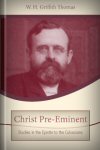
Christ Pre-Eminent: Studies in the Epistle to the Colossians
- Author: W.H. Griffith Thomas
- Publisher: The Bible Institute Colportage Ass’n
- Publication Date: 1923
- Pages: 125
In this volume, with his characteristic straightforward style, W.H. Griffith Thomas dives into Paul’s epistle to the Colossians, providing insights for practical application. Thomas centers his discussion on the supremacy of Christ as a major theme of this epistle.
William Henry Griffith Thomas was born in 1861 in Oswestry, Shropshire, England. He went on to graduate from Christ Church, Oxford with a doctor of divinity. He served as principal of Wycliffe Hall, Oxford, from 1905 to 1910. In 1910, Thomas moved his family to Canada, where he was professor of Old Testament literature and exegesis at Wycliffe College in Toronto for nine years. In the years following, Thomas continued to write and speak extensively, publishing more than 40 books and booklets. He co-founded Dallas Theological Seminary with Lewis Sperry Chafer.
Reviews
4 ratings

Faithlife User
2/8/2018
Swartzentrover
2/25/2017
Fake Christians taking out of print books and charging $143.99 for something I can get for free on the Internet is a SIN. I expect secular scum like Google to do something this evil but not a "Christian" company. I hope you enjoy your life on earth rich rip-off scum because hell is where all thieves wind up.David
12/29/2016
Would love to see an expansion pack put up for Community Pricing. Must Christians sin? "Mending their nets" (nd) Grace: Thoughts for the Christian Year (nd) Priest or Prophet?: a question for the day (nd) Is Self-Examination a Christian Duty? (nd) "The power of Christ" (1894) The Acts of the Apostles: outline studies in primitive Christianity (1880) Evolution and the Supernatural (1900) The Catholic Faith. A manual of instruction for members of the Church of England. (1904) "Ich dien" = "I serve": a call for the New Year (1904?) Royal and Loyal: thoughts on the two-fold aspect of the Christian life (1905) Shall I go to Confession? (1906) Genesis: A Devotional Commentary (1907) Life Abiding and Abounding: Bible studies in prayer and meditation (1909) Hard to be Understood: Studies in Difficult Texts. Second series (1909) The Training of Candidates for Holy Orders (1908) The Power of Peace (1908) Our Lord's Work in Heaven (1911) Romans (1911) The Holy Spirit of God (1913) Strongholds of Truth (1914) An examination of Bishop Gore's open letter on "the basis of Anglican fellowship" (1914) Premillennialism : a reply to the Sunday School Journal (1916) The Grace of God: Two Studies in the Epistle to Titus (1916) How to Study the Gospel of Mark (1917) What Justification is and What it Does (1918) Modernism in China (1921) Books That Stand for the Faith: with suggestions as to ways in which Christian people may "contend earnestly" for their sacred trust (1922) How to study the four Gospels (1924) Some Tests of Old Testament Criticism (1924) Sermon outlines, exegetical and expository, (1947) Outline studies in the Gospel of St. Luke (1950) Through the Pentateuch chapter by chapter (1957) Outline studies in the Gospel of Matthew (1961)

Thomas M. Campbell
12/3/2013
This is a very good price for such great writings as this great man of God has brought to the readers eyes. Don't fail to get this work at this price. You will not be disappointed, but blessed.John Reiffel
11/24/2013
Too expensive with Hebrews doubled up (same content-different publishers). Matthew, Luke, Genesis and upgraded Colossians and Philemon missing.
